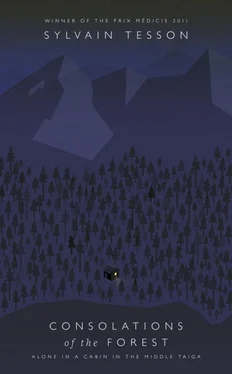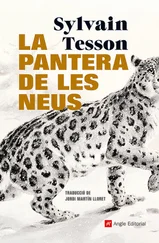At four in the afternoon, I close Chrétien de Troyes and set off to fish at hole no. 2, an hour’s slog to the north. (Hole no. 1 is the spot out in front of the cabin.) The shore slips by, harsh and austere. There is joy in these woods, but not an ounce of humour. Maybe that’s what makes the faces of hermits so stern and Thoreau’s writings so serious. I catch three char just under eight inches. They wind up on the stove, stuffed with blueberries, in a drizzle of oil. The flesh is tasty. Fresh, it goes well with vodka. Everything goes well with vodka. Except a woman’s kisses. No danger of that.
18 APRIL
Sergei arrives at my cabin at eight in the morning. He’s been visiting the Volodya up in Elohin, and I didn’t hear his car out on the lake. As usual, he pops in without knocking – and I let out a yell, then take a long minute to recover my inner equilibrium, upended by the intrusion. My tea isn’t even ready, so at least I didn’t spill that.
‘Your cabin, you keep it nice. With Volodya, it’s what we call a German cabin.’
‘Oh, really?’
‘You want to come to Pokoyniki? I’ll bring you home again.’
‘Okay… We’ll have some tea, though?’
‘No, just come, we’re in a hurry.’
Ten minutes later, I shut the padlock and climb into the car. We slip off to the south. In Russia, everything happens in a hurry: life is a drowsy thing shaken by spasms.
In Pokoyniki, big doings. Sergei and Yura-with-the-pale-eyes have taken advantage of the frozen lake to build a pontoon on pilings – a platform baptized ‘the island’ – out in the big marsh that prolongs the bay on its northern flank. With wooden levers, jacks and ropes, we spend the afternoon hoisting a metal railway car onto the wooden platform. Inside: a bed and a stove.
‘The shoreline marks the boundary of the reserve, and the limit of its jurisdiction,’ announces Sergei. ‘So the island will be independent territory.’
‘Free?’ I ask.
‘Yes, free and independent. We have just created the free and autonomous territory of Pokoyniki .’
In the forest, shadows slip through the larches: horses are moving fluidly among the tree trunks. Their hooves crunch through the snow crust with the sound of a fist punching a feather pillow, and their nostrils give off plumes of vapour. These animals belonged to a herd maintained by the employees of the meteorological station at Solnechnaya, a little over a mile north of Pokoyniki, but they returned to the wild in 1991, when their caretakers abandoned the station at the collapse of the Soviet Union. At dusk, a four- or five-year-old horse comes wandering among the cabins, his head hanging. He has left the herd to die, and lies down facing the lake. Sergei heaves a sigh, then dispatches him with a dagger thrust to the carotid. We chop him up with axes. Jays take their posts at the tops of the pines, and the entrails tumble out with a slurp, silky and perfectly coiled together, steaming in the cold. Night falls on this bloody affair. The dogs, who had been awaiting their turn, are given the go-ahead.
That evening, Pokoyniki is the scene of considerable excitement: the new director of the nature reserve, S.A., has come to visit his rangers, accompanied by his henchmen, who busily unload the vodka and cognac. I look longingly at those crates, because there’s enough there to erase from my memory the sight of that horse panting hard as it gave up the ghost. Natasha has prepared some venison soup. A buffet in the Russian style is spread out on the table: a pell-mell of grilled catfish fillets, a haunch of moose and Siberian sausages. Everyone drinks into oblivion.
‘Where were you born, director?’ I ask.
‘In the Republic of Tuva.’
‘That’s Lenin’s native region,’ says Sergei.
‘Well, then,’ I suggest, ‘let’s drink to dictators who govern empires and nature reserves.’
‘And also to Tupolevs,’ adds one of S.A.’s thugs.
‘Why?’ I ask.
‘The best plane in the world: the Poles just bit the dust in one.’
Natasha offers the director a bag of frozen fish. Businessman though he may be, S.A. can’t conceal the twinkle of delight in his eyes. Hereabouts people still haven’t forgotten the hard times of the past.
19 APRIL
The cognac didn’t agree with me. It’s nine in the morning and I have a railway tie stuck crosswise in my head. Yura with the fog-grey eyes awakens me: we have to go pull in the nets. Sasha of the missing fingers accompanies us. I nurse my hangover in the van, collapsed on some coils of rope, and listen to the two men rattle on about their favourite theme:
‘Why are there so many Muslims in your country?’
For a muzhik, France offers two subjects of astonishment: that the people of Napoleon’s Grande Armée beg for government help when faced with not even an inch of snow, and that they let their cities burn while they have 3,000 soldiers deployed in the mountains of Afghanistan. Sasha asks me about these things every single time we meet.
The ice-fishing shelter is nine miles from Pokoyniki. Inside the corrugated metal cabin, a wooden floor with a cut-out allows access to the fishing hole below. A gas stove heats the place, and we work in woollen shirts. We begin by raising many hundreds of feet of cordage with a hand winch that creaks at each turn. For two hours, Yura turns the handle, staring into space. The net surges up from the depths. The two Russians haul the nylon tresses from the water and harvest the omul, a freshwater whitefish endemic to Lake Baikal. The plastic tubs fill with hundreds of fish. In the eerie turquoise light, the lake offers its treasures. The strangest thing is that it keeps giving them to us on demand after thousands of years. Lunch: five fish tossed into a pot and sluiced with three glasses of samogon , the caramel-coloured moonshine Sasha makes himself in his dacha at Severobaikalsk. Sergei drives me back home. We sit silently, gliding slowly over a surface worthy of an artist’s brush: the marbling of the ice, the chaotic sculptures, the army of pines beneath their snowy burden, and the black granite draperies compose on the canvas of the sky a tortured tableau compared to which the desolate landscapes of the nineteenth-century German Romantic artist Caspar David Friedrich look like Haitian folk art.
We’re stopped short by a crevasse.
‘This one opened up today,’ Sergei announces.
‘How will we get past?’ I ask.
‘A “trampoline”…’
‘And for your return trip?’
‘A detour.’
The two edges of a fracture are not always on the same level. As it shifts, the ice may raise one of the lips, and by using this discrepancy, drivers sometimes succeed in launching their vehicles over such obstacles. I have confidence in Sergei, but I feel a twinge when, going full blast from a head start of a good 160 feet, he crosses himself.
We make it.
20 APRIL
Here the journal breaks off for eight days for administrative reasons. The Russian authorities require my return to civilization to seek an extension of my visa. I tear myself away from the lake, take planes, besiege diplomatic and cultural officials who hibernate year-round more deeply than bears, obtain the stamp I covet, batten down my hatches so I won’t get sucked into the big city, sleep five tense hours a night, get horribly drunk, heave another load of provisions and summer equipment into the back of a truck, retrace my steps, arrive at the lakeshore off the southern tip of Olkhon Island, and find the hydrofoil that had recently delivered me waiting for me there.
28 APRIL
Hydrofoils are the gem of Russian iron and steel metallurgy. Powered by a propeller, the machine moves on a cushion of air. So it couldn’t care less about the fissures that scar the ice this late in April. Within four hours, we reach Pokoyniki, making as much noise as a massive Antonov airlifter. While I was gone, the lake surface has turned milky: melting slightly, the ice now has a nacreous crêpe surface that crackles faintly underfoot. Passing the hamlet of Zavorotni, I stop in to visit V.E., who entrusts two of his twelve dogs to me. Aika is a black female; Bek, a white male. They are four months old. They will bark if bears begin approaching the cabin towards the end of May. I also have my distress flare gun. If attacked, you just fire at the animal’s paws: the detonation and fireworks usually persuade the bear to buzz off.
Читать дальше












